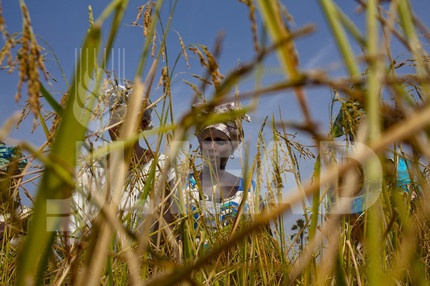
Have we been feed in the past by agribusiness interests overtly and/or implicitly implying contradiction between more food and better environmental conservation or is the perspective being offered today a bit of sugarcoating tough choices between man and nature? “There is no trade-off between feeding people and saving our Planet,” according to Kanayo F. Nwanze, the President of the UN International Fund for Agricultural Development (IFAD Also Credit for Above Photo), attending the UN Climate Change Conference in Durban, South Africa. Rather, participants in Durban and the UN’s major food and agriculture organizations as WFP and IFAD stress “the need to enable smallholder farmers to become more resilient to climate change and to produce more food in ways that are environmentally sustainable.” See Film Report: “Food Prices Killing Poor-Staggering Middle Classes” -
diplomaticallyincorrect.org/films/movie
Challenge to Small Farmers:
According to IFAD, the world’s 500 million smallholder farms will have to significantly increase production over the next four decades to keep pace with a growing global population. They are required to do that in the face of more frequent extreme weather events and shifting weather conditions caused by climate change. New opportunities may also be developing, including aquaculture: Read – “Aquaculture Answer to Food Insecurity & Poverty” -
diplomaticallyincorrect.org/films/blog_post/aquaculture-answer-to-food-insecurity-poverty-by-ambassador-mo/41667
“It is clear that food security and climate change, humanity’s two greatest challenges in the 21st century, are inextricably linked. ...Out in their fields, farmers are already adapting to the changing climate and realizing that they must respect and preserve the environment if they are to feed their families and produce a surplus for markets. And policymakers at the country level are citing the impact of extreme weather on their crop production and asking for climate change to be addressed in rural development projects.” Mr. Nwanze noted that global investment in agriculture had dropped by half over the past 30 years, and called for greater efforts towards expanding public investment in research to build farmers’ resilience to climate change and to support their adoption of sustainable agricultural practices.
Good practices are already showing very positive results in several poor countries both for the environment and food production. According to IFAD’s Nwanze: “There is already a scaling up of sustainable agricultural practices in many parts of the world, What we need now is a rapid acceleration of these changes so that smallholder farmers can successfully feed their families, connect to markets and contribute more to global food production.” See Our Conversation – “WhyHunger at the UN: Asking the Questions, Seeking the Answers” -
diplomaticallyincorrect.org/films/movie/whyhunger-un/29316
Along with IFAD, the UN Food and Agriculture Organization (FAO) and UN World Food Programme (WFP) have been financially backed by the European Union’s Food Facility (EUFF) to help feed 22 million and to demonstrate that investing in agriculture and nutrition improves global food security. Recent surge in food prices along with climatic disasters has conspired to push millions into poverty and hunger. (READ – “State of Food Insecurity in World 2011” -
diplomaticallyincorrect.org/films/blog_post/state-of-food-insecurity-in-world-2011-un-report-by-ambassador-mo/36153 ).
IFAD link to Full Statement: -
www.ifad.org/media/press/2011/87.htm
See Our Conversation – “WhyHunger at the UN: Asking the Questions, Seeking the Answers” -
diplomaticallyincorrect.org/films/movie/whyhunger-un/29316
By Ambassador Muhamed Sacirbey
Facebook – Become a Fan at “Diplomatically Incorrect”
Twitter – Follow us at DiplomaticallyX
“Ecology-Diplomat” Channel -
diplomaticallyincorrect.org/c/ecology-diplomat

